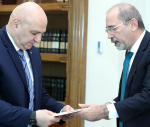You are here
UN peacekeeping gets tougher
Jun 29,2017 - Last updated at Jun 29,2017
The United Nations is often scapegoated for falling short of its peacekeeping troops and deployments.
Why are they not in Syria or Yemen, Libya or along the Palestinian-Israeli border?
Why did the US and the UK make it impossible for the few UN troops present at the onset of the genocide in Rwanda to have their numbers significantly augmented and, as a result, those few on the ground had no choice but to withdraw when some of their members were killed?
All good questions if not easy to answer.
In Syria, for example, where exactly would they be deployed?
A better question is why did they not go in at the beginning of the civil war, when things were not so complicated and Al Qaeda and Daesh were not around?
Then there is the bad behaviour of UN troops.
In Mali, French peacekeepers were found to have engaged in paedophilia with local children.
In Congo, peacekeepers from the Indian subcontinent have been found to be raping. In Bosnia, Dutch troops washed their hands and pulled back after they felt they could not do anything to avert the onset of a pogrom that happened almost before their eyes.
In Somalia, US troops supposedly there under UN command, fled when the going got rough, and then president Bill Clinton blamed the UN for the debacle.
On the other side of the coin are the great unsung victories of the UN troops, in El Salvador where at the end of the civil war the UN held the ring and organised fair elections, in Namibia at the end of the colonial war against South Africa the UN did the same, in Cyprus where they averted a Bosnian-type Christian/Muslim war.
The Lebanon, Sinai, Cambodia and Macedonia are all success stories in bringing about or confirming a peace.
Sometimes it is not troops that are needed but observers and inspectors.
In Colombia the FARC left-wing guerrilla group that has fought the government for decades is supposed to be disarming under the terms of last year’s peace agreement.
The UN is tasked with finding the arms caches and dismantling them, a painstaking and dangerous job.
FARC says there are more than 900 caches, all over the country. Some of them are only reachable by river or on foot through dense jungle and high mountains.
The fear is, reported by the Financial Times recently, that if the UN does not reach the caches soon, paramilitaries or criminal groups will.
Today there are 62 peace operations around the world deploying over 150,000 personnel.
Of these 69 per cent are deployed by the UN, 29 per cent by regional organisations (usually with the blessing of the UN) and 2 per cent by ad hoc organisations.
2 of the big powers on the Security Council, France and the UK, have long been sending their soldiers under the UN flag.
More recently so has China — in Africa it has over 1,000 soldiers.
The US has long provided aircraft to move UN troops to their destinations.
Last year, the number of UN peacekeeping personnel fell by 6 per cent, largely because of the end of successful work in Liberia and Cote d’Ivoire, the first decrease since 2011.
Today, Africa has 26 peacekeeping operations, the Americas 3, Asia and Oceania 7, Europe 18 and the Middle East 8. (These figures comprise both the UN and regional organisations, such as the EU and ECOWAS, the West African military organisation).
3,500 UN peacekeepers have lost their lives since the establishment of the first UN peacekeeping operation in 1948. However, the annual fatality rate for uniformed personnel decreased steadily between 1990 and 2016.
Last week, the UN took a new departure.
Pushed by France, the Security Council unanimously backed the deployment of a new multinational military force of 5,000 to fight terrorist groups operating in parts of Africa.
In short, it is a counter-terrorism force, able, unlike peacekeepers, to take the offensive and use sophisticated firepower.
The troops will come from Burkina Faso, Chad, Mali, Mauritania and Niger.
France will provide much of the financial and logistic support. Its mandate is to combat terrorism, drug traffickers and people smuggling, all of which thrive in the Sahel.
Is this the beginning of what was proposed in 1947: the creation of a UN military?
Article 42 of the Charter says: “The Security Council may take such action by air, sea or land forces as may be necessary to maintain or restore international peace and security”.
Some say that is not their image of the UN. But the African decision could be a harbinger of plans to come.
As long as the Security Council remains the supreme authority over deployments, probably most people would support this development.
We all need the UN to have a future that works.












